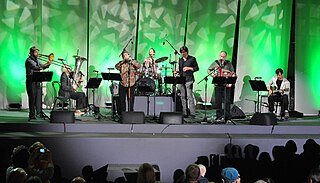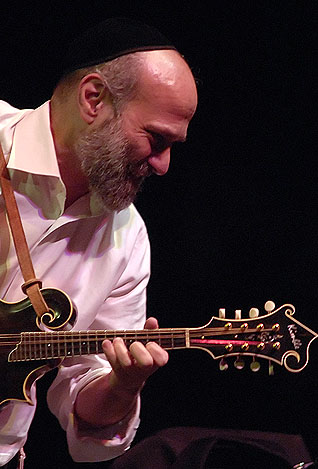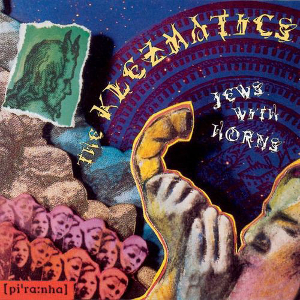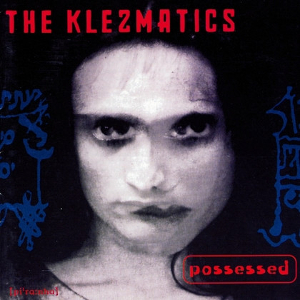
Klezmer is an instrumental musical tradition of the Ashkenazi Jews of Central and Eastern Europe. The essential elements of the tradition include dance tunes, ritual melodies, and virtuosic improvisations played for listening; these would have been played at weddings and other social functions. The musical genre incorporated elements of many other musical genres including Ottoman music, Baroque music, German and Slavic folk dances, and religious Jewish music. As the music arrived in the United States, it lost some of its traditional ritual elements and adopted elements of American big band and popular music. Among the European-born klezmers who popularized the genre in the United States in the 1910s and 1920s were Dave Tarras and Naftule Brandwein; they were followed by American-born musicians such as Max Epstein, Sid Beckerman and Ray Musiker.

The Klezmatics are an American klezmer music group based in New York City, who have achieved fame singing in several languages, most notably mixing older Yiddish tunes with other types of more contemporary music of differing origins. They have also recorded pieces in Aramaic and Bavarian.

Frank London is an American klezmer trumpeter who also plays jazz and world music.

Sophie Solomon is a British violinist, songwriter and composer who fuses many different musical influences into her music. She was artistic director of the Jewish Music Institute, SOAS from 2012 to 2015 and is now Chief Marketing Officer at high-growth music technology start-up ROLI.
Yale Strom is an American violinist, composer, filmmaker, writer, photographer and playwright. Strom is a pioneer among klezmer revivalists in conducting extensive field research in Central and Eastern Europe and the Balkans among the Jewish and Romani communities since 1981. Initially, his work focused primarily on the use and performance of klezmer music between these two groups. Gradually, his focus increased to examining all aspects of their culture, from post-World War II to the present. He was among the first of the klezmer revivalists to identify the connection between klezmer and lautare and explore that connection in his scholarly and artistic works.

Andrew Edward Statman is a noted American klezmer clarinetist and bluegrass/newgrass mandolinist.
Hankus Netsky is an American multi-instrumentalist, composer, and ethnomusicologist. He chairs the Contemporary Improvisation Department at the New England Conservatory. Netsky is founder and director of the Klezmer Conservatory Band, an internationally renowned Yiddish music ensemble, and serves as research director of the Klezmer Conservatory Foundation, a non-profit organization dedicated to the preservation and perpetuation of traditional Eastern European Jewish music. He plays the piano, accordion, and saxophone.

Michael Alpert is a klezmer musician and Yiddish singer, songwriter, multi-instrumentalist, scholar and educator who has been called a key figure in the klezmer revitalization, beginning in the 1970s. He has performed solo and in a number of ensembles since that time, including Brave Old World, Kapelye, Khevrisa, The Brothers Nazaroff, Voices of Ashkenaz and The An-Sky Ensemble, and has collaborated with clarinetist David Krakauer, hip-hop artist Socalled, singer/songwriter/actor Daniel Kahn, bandurist Julian Kytasty, violinist Itzhak Perlman, ethnomusicologist and musician Walter Zev Feldman, trumpeter/composerFrank London and numerous others.
Mark Slobin is an American scholar and ethnomusicologist who has written extensively on the subject of East European Jewish music and klezmer music, as well as the music of Afghanistan, where he conducted research beginning in 1967. He is Winslow-Kaplan Professor of Music Emeritus at Wesleyan University, where he taught both music and American Studies from 1971 to 2016.
Leon Schwartz, Yiddish אריה–לייב שווארץ (1901-1990) was a klezmer and classical music violinist born in the village Karapchiv, Austria-Hungary near the town of Vashkivtsi in today’s Vyzhnytsia Region of the Bukovina area of Ukraine.

Margot Leverett is a New York-based clarinettist. Born in Ohio, she lived in Pittsburgh, Pennsylvania and Buffalo, New York before studying at Indiana University School of Music. At Indiana, she was classically trained. Leverett later became interested in klezmer, a traditional musical style of the Jews of Eastern Europe. She studied with klezmer clarinettist Sidney Beckerman and was a founding member of The Klezmatics in 1985. The Klezmatics, a band associated with the Klezmer revival would later become the first klezmer band to win a Grammy Award.

Moisei Beregovsky was a Soviet Jewish folklorist, musicologist and ethnomusicologist from the Ukrainian SSR who was a key figure in the study of Jewish music. He collected, studied and published about klezmer music, Yiddish song, wordless nigun melodies, and the music of Purim plays. His published collections, mostly only released after his death, remain important sources of Jewish music from the late Russian Empire and early Soviet period. Most of his research was done during the period of 1927–1949, during the Stalin era, during which he was faced not only with ideological restrictions, but a period of imprisonment in a forced labour camp from 1950 to 1955. He was rehabilitated after 1955 and continued his work in his final years during the Khrushchev-era.

Adrienne Cooper was a Yiddish singer, musician and activist who was integral to the contemporary revival of klezmer music.

Jews With Horns is the third album by the American klezmer band the Klezmatics, released in 1995. It is the first album on which Matt Darriau performed, which led to his induction as a full member of the group. Marc Ribot is featured on the second track, "Fisherlid".

Possessed is an album by the American klezmer group the Klezmatics, released in 1997.

Lisa Gutkin is an American violinist, singer and songwriter of The Klezmatics. She played in Sting's The Last Ship, had a cameo appearance in “Sex and the City,” and is a MacDowell Fellow at the MacDowell Colony. Lisa appears on hundreds of recordings including From Here On In, a CD of her original songs produced by John Lissauer, and Play Klezmer Fiddle!, an instructional DVD. She has co-authored songs with Woody Guthrie, Anne Sexton, and Maggie Dubris, and composed for symphony orchestra, dance, and film. She is the Co-Music Director and Co-Composer for the Broadway show "Indecent (play)" which won 2 Tony Awards for Best Direction of a Play and Best Lighting Design of a Play in 2017.
Elie Rosenblatt is a klezmer violinist known for his interpretation and recreation of early nineteenth century klezmer violin style. Hailing from Canada, he immigrated to Israel where he is involved in klezmer performances with the Jerusalem Klezmer Association. He has performed and taught internationally, and had participated at the annual Klezkanada program from its inception. In 2001, Rosenblatt released his first CD with tsimbl player Pete Rushefsky entitled Tsimbl un Fidl: Klezmer Music for Hammered Dulcimer & Violin. The album was hailed as a work of "impeccable scholarship with virtuoso performances" and considered "essential in any klezmer collection".
Eleanor Reissa is an American actress, singer, theatre director, playwright, librettist, choreographer, translator, and author based in New York City. She works and performs in English and Yiddish speaking stages, and also interprets and performs Yiddish theatre and songs.
KlezKanada is a Canadian organization for the promotion of klezmer music and Yiddish culture. Its principal program is a week-long Jewish music festival founded in 1996 that takes place annually in August at Camp B'nai B'rith in Lantier, Quebec. The organization also hosts workshops, concerts, and other educational programs in Montreal throughout the year.












